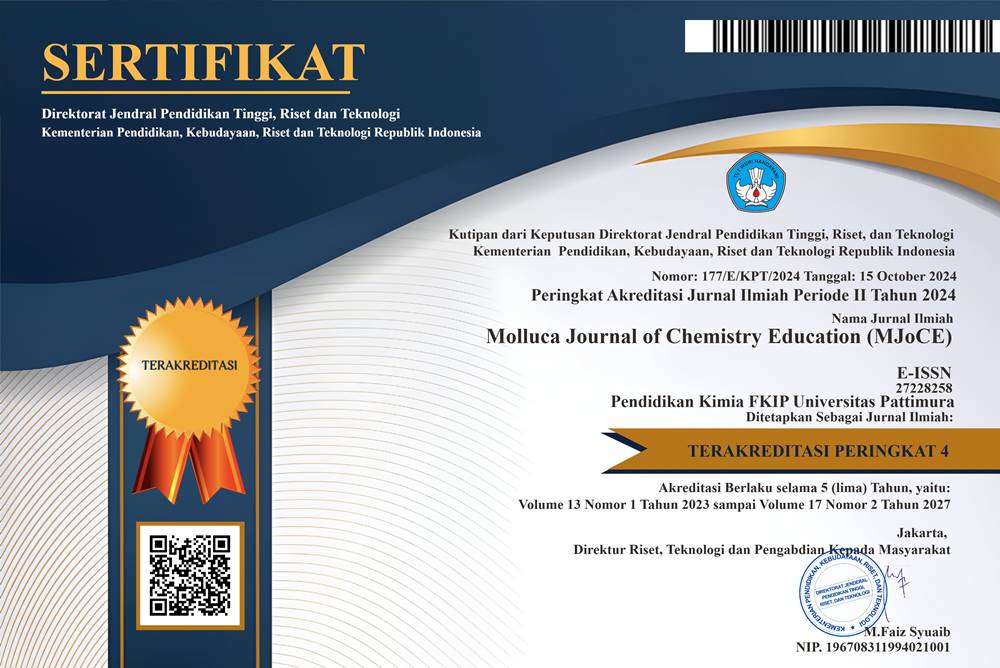Strategi STRATEGI CONCEPTUAL CHANGE TERINTEGRASI RECALL MEMFASILITASI PROSES TERJADINYA KONFLIK KOGNITIF DAN REDUKSI BEBAN MISKONSEPSI MAHASISWA CALON GURU KIMIA
Abstract
Strategi conceptual change terntegrasi recall dikembangkan dengan tujuan untuk memfasilitasi terjadinya konflik kognitif dan reduksi beban miskonsepsi mahasiswa calon guru kimia. Penelitian i studi kasus, dengan subjek penelitian mahasiswa calon guru kimia yang terdeteksi mengalami beban miskonsepsi tinggi pada konsep ikatan ionik lebih dari 50%, menggunakan metode three tier diagnostic test. Mahasiswa yang terdeteksi beban miskonsepsi tinggi pada konsep ikatan ionik, diperbaiki struktur kognitif (skemata) secara individual menggunakan strategi conceptual change terintegrasi recall menyebabkan terjadinya konflik kognitif dan reduksi beban miskonsepsi. Data diperoleh menggunakan triangulasi metode, yaitu observasi, wawancara dan video. Hasil penelitian strategi conceptual change terintegrasi recall memberikan dampak yang baik pada, (1) proses recall membantu memberikan informasi miskonsepsi yang tersimpan dalam long term memory, (2) terjadi peningkatan konflik kognitif, menyebabkan perubahan konsepsi dengan mudah, (3) terjadi penurunan beban miskonsepsi (MK) menjadi tahu konsep (TK).
Downloads
References
Creswell, J. W. (2014). Research Design. Qualitative, Quantitative, and Mixed Methods Approacher. 3th Edition. Sage Publications. Thousand Oaks California.
Chakraborty, A. & Mondal, B.C. (2012). Misconceptions in Chemistry at IX th Grade And Their Remedial Measures. Indian Streams Research Journal. Vol 2, Issue. 7, Aug 2012. pp. 1-9.
Chi, M. T. H. (2008). Three Types of Conceptual Change: Belief Revision, Mental Models Transformation, and Categorical Shift. In Vosniadou S. (Ed.), Handbook of Research on Conceptual Change. Hellsdale, NJ: Lawrence Erlbaum. pp. 61-82.
Costu, Bayram, Ayas, Alipasa, Niaz, Mansoor, Unal, Suat, & Calik, Muammer. (2007). Facilitating Conceptual Change in Students’ Understanding of Boiling Concept. Journal Science Education Technology (2007) 16: 524-536. DOI 10.1007/s10956-007-9079-x. @ Spinger Science. Business Madia, LLC 2007.
Ghazanfari M., Ziaee M., Sharifianfar E. (2014). The Impact of Illustration on Recall of Short Stories. Internaational Conference Current Trends in ELT.
Kabaca, T., Karadag, Z., & Aktumen, M. (2011). Misconception, Cognitive Conflict and Conceptual Change in Geometry: a case study with pre-service teachers. Mevlana International Journal of Education (MIJE). 1(2), pp. 44-55. diperoleh dari http://mije.mevlana.edu.tr.
Kolomuc, A.& Tekin, S. (2011). Chemistry Teachers’ Misconceptions Concerning Concept of Chemical Reaction Rate. Eurasian: Journal Physics and Chemistry Education. Vol.3 No.2, pp.84-101.
Lemma, A. (2013). A Diagnostic Asessment of Eighth Grade and Their Teachers’ Misconceptions About Basic Chemical Concepts. AUCE, 3(1), pp 39-59.
Lee, G. & Kwon, J. (2001). What do you know about students’ cognitive conflict: a theoretical model of cognitive conflict process. Procedings of 2001 AETS Annual meeting. Eric Document Reproduction Service No. ED 453083, pp 309-325.
Palisoa, N., Suyono, & Agustina, R., Prahani Binar K., (2017) Integration of strategy conceptual change using strategy 3R (recall, recognition, and redintegration) to reduce barden high misconception. International Jounal of Education Research. Vol. 5(3), pp. 37-44.
Pesman, H. & Eryilmaz, A. (2010). Development of a Three-Tier Test to Assess Misconceptions about Simple Electric Circuits. The Journal of Educational Research. Vol. 103, pp.208-222.
Posner, G. J., Strike, K. A., Hewson, P. W. (1982). Accommodation of a Scientific Conception: Toward a Theory of Conceptual Change. Departement of Education, Cornell University, Ithaca. New York.
Sheehan M., Peter E.C., Hayes S. (2014).The Chemical Misconceptions of Pre-service Science Teachers at the University of Limerick: Do they change. Departement of Chemical and Enviromental Science & National Centre for Excellence in Mathematics and Science Teaching and Learning. University of Limerick. Ireland.
Suyono, Masriyah, dan Muchlis. (2015). Preparasi Sarjana Pendidikan Kimia Tanpa Miskonsepsi Di FMIPA Unesa. Laporan Akhir Penelitian Unggulan Perguruan Tinggi. Bidang Unggulan. Tanpa Publikasi.
Unal S., Costu B., Ayas A. (2010). Secondary School Students’ Misconception of Covalent Bonding. Journal of Turkish Science Education.
Copyright (c) 2021 Molluca Journal of Chemistry Education (MJoCE)

This work is licensed under a Creative Commons Attribution-NonCommercial-ShareAlike 4.0 International License.





